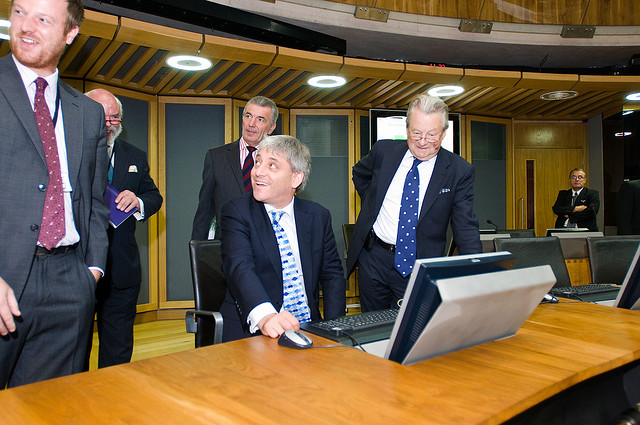The Speaker election row tells us two important things about parliament
On 26 March, its final sitting day, the House of Commons rejected government proposals to reform how the Speaker is elected at the start of the new parliament. Here Meg Russell reflects on what this teaches us about parliament, suggesting it holds two lessons. First, that the 2010 House of Commons was more resistant than its predecessors to government dominance; but second, that further reform is still needed to reduce that dominance.
Two weeks ago the House of Commons met for the last time before the general election. A debate had been scheduled by the Backbench Business Committee to allow retiring MPs to make short valedictory speeches. This might have served as the highpoint of the day – a dignified and nonpartisan moment before election hostilities began. But instead the day was hijacked by a completely unexpected and high-profile row, when Commons Leader William Hague brought forward a motion to change the procedure that the new parliament would follow to elect its Speaker. This was widely viewed as an ill-disguised attempt to unseat Speaker Bercow, sprung in a completely underhand manner. In the event, the motion was defeated by 228 votes to 202. This brought an ignominious end to Hague’s own otherwise distinguished Commons career, and saw the Commons break up with an air of bitterness. Nonetheless there was also something to celebrate in terms of the defiant independence shown by Commons backbenchers, which rounded off nicely the independent 2010-15 parliament. Yet these events also pointed towards a reform agenda for its successor parliament.
The motion, entitled ‘Elections for positions in the House‘, was tabled late on 25 March in the names of Hague and his Deputy Tom Brake MP. News of this seeped out that evening, with Labour sources describing it as an attempted ‘coup d’état’. The motion made reference to a 2011 report from the Procedure Committee, which had suggested that the Commons should be consulted on whether election of the Speaker at the start of the new parliament should be conducted by secret ballot or by open vote. In his remarks, William Hague emphasised that the motion was giving the Commons this opportunity: the proposition was that a secret ballot should be used.
Debate began as a result of an urgent question, tabled by Labour backbench veteran Gerald Kaufmann (notably one of Bercow’s proudest achievements has been the granting of numerous urgent questions, and he excelled himself on 26 March – by granting three, which delayed debate and allowed more MPs to gather). This was immediately followed by the one hour debate scheduled for the motion. Throughout these discussions references to the principle of a secret ballot showed mixed views: on the one hand, such ballots are increasingly common in the Commons (e.g. for the initial election of Speaker, and election of select committee chairs); on the other, they compromise transparency and MPs’ accountability to constituents for how they vote. Applied to this particular situation, a secret ballot might be criticised for allowing a Speaker’s detractors to hide from view, but could be deemed necessary if such members feared retribution should their unseating fail. But the bulk of the short debate notably did not focus on these questions at all, instead questioning the tactics by which the motion had reached the agenda.
As many members pointed out, the Procedure Committee’s proposal had been awaiting debate for more than two and a half years. The committee itself had urged that the matter be debated in ‘prime time’, allowing all members ample opportunity to be involved in the decision. Instead, while claiming to follow the committee’s recommendation, Hague had tabled his motion just 24 hours before the Commons was due to prorogue, when many members were likely to have departed London. As emerged in debate, the opposition frontbench had been given no notice of the motion, and neither had the chair of the Procedure Committee Charles Walker (Conservative), who made an impassioned and widely reported speech claiming that he had been ‘played as a fool’. Other Conservative MPs claimed that they had been called back from campaign visits for a mysterious ‘meeting’ in an apparent attempt to ensure good attendance on their side of the House before the tabling of the motion was publicly known. Various Conservative members (as well as those from other parties) were highly critical of such tactics. Jacob Rees-Mogg expressed ‘deep sadness‘ that William Hague should end his distinguished parliamentary career in such a way. In the division, 23 Conservatives and 10 Liberal Democrats voted against the motion, along with all MPs voting from other parties (while 198 Conservatives and 4 Liberal Democrats in favour). Opponents included Walker, Rees Mogg and chair of the backbench 1922 Committee Graham Brady.
These dramatic events, I suggest, teach us two important things about parliament: one positive and the other negative. On the positive side, those speaking up for due process and for a voice for parliament (and particularly backbenchers) against the executive won out. This could be characterised as a final defiant act by an increasingly independent 2010 House of Commons. Partly as a result of changes recommended by the ‘Wright committee‘, and partly the actions of Bercow himself, backbench independence and a sense of collective backbench identity has grown since 2010. The Commons is much better able to operate in what Anthony King famously called the ‘cross-party’ or ‘non-party’ mode than it used to be. Key changes included creation of the Backbench Business Committee(based closely on Constitution Unit research), and election of select committee members and chairs, coupled with an increasing tendency to backbench rebelliousness, as documented by Phil Cowley and colleagues. All of these encourage MPs to think for themselves, build cross-party alliances and be prepared to question the decisions of whips and frontbenchers. Notably, at a very similar moment in the 2005-10 parliament standing orders to implement some of the Wright committee’s key recommendations were still awaited, despite promises from government. When it became clear that no debating time for these was to be provided, there was a very ill-tempered pre-prorogation debate. On that occasion backbenchers lost; on this occasion they won. This could be seen as a kind of overdue retribution, as well as an indication that the world has changed.
Yet the fact that such arguments have recurred at all has to be viewed as negative. Hague’s motion demonstrated the extent to which, despite all that’s changed, the government still has extensive freedom to control the parliamentary agenda, and to bring forward business of its choosing – even at extremely short notice. As expressed in the notorious Standing Order 14, the default is for government business to take precedence at every sitting in the Commons. Although time is guaranteed to the opposition, and now to the Backbench Business Committee, the government still decides when such debates take place. The weekly Business Statement (usually debated on a Thursday) sets out the business for the week ahead, but cannot be amended or voted upon. Supplementary business statements can also be made – though as one MP pointed out on 26 March, the motion on the Speaker had not even been included in the supplementary statement made two days previously. This degree of executive licence is arguably at its least defensible when it comes to proposing changes to parliamentary procedure itself. It should surely be for parliament, not government, to schedule debates about its own standing orders? This matter was tackled in our 2007 report that informed the Wright committee, which noted that in some parliaments (including the Scottish Parliament) proposals for procedural change can only be put on the agenda via the Procedure Committee. We also noted that the Business Statement in Scotland is amendable, and must be approved by the chamber itself. Our proposal (recommendations 27-33) that such a system should be adopted by the House of Commons won the support of the Wright committee (recommendations 14-16), but has never been acted upon. We further suggested (recommendation 1) that a radical solution would be to ‘turn the current logic of standing order no. 14 on its head’, so that the default was for time to belong to parliament, not government.
The events of 26 March demonstrate that, while the Commons may have embraced a new more independent spirit, reform to give members control their own institution’s agenda remains incomplete. The government’s attempted ambush, while defeated, serves as a timely reminder of parliament’s vulnerabilities. The proposals just indicated – to limit government’s ability to bring forward procedural motions without Procedure Committee support, and to implement the Wright committee’s proposal that the Commons should ultimately vote on its own agenda – thus provide an ideal reform agenda for the new parliament.
—
Note: this post originally appeared on the Constitution Unit blog and is reposted with permission. It represents the views of the author and not those of Democratic Audit or the LSE. Please read our comments policy before posting.
—
 Meg Russell is Professor of British and Comparative Politics, and Deputy Director of the Constitution Unit, at UCL. She is author of The Contemporary House of Lords: Westminster Bicameralism Revived(Oxford University Press, 2013) and numerous other publications about the Lords. Enough is Enough: Regulating Prime Ministerial Appointments to the Lords was published on 9 February 2015 by the Constitution Unit.
Meg Russell is Professor of British and Comparative Politics, and Deputy Director of the Constitution Unit, at UCL. She is author of The Contemporary House of Lords: Westminster Bicameralism Revived(Oxford University Press, 2013) and numerous other publications about the Lords. Enough is Enough: Regulating Prime Ministerial Appointments to the Lords was published on 9 February 2015 by the Constitution Unit.






 Democratic Audit's core funding is provided by the Joseph Rowntree Charitable Trust. Additional funding is provided by the London School of Economics.
Democratic Audit's core funding is provided by the Joseph Rowntree Charitable Trust. Additional funding is provided by the London School of Economics.
#UK – The Speaker election row tells us two important things about #parliament https://t.co/ThtBsSdCBT
The Speaker election row tells us two important things about parliament https://t.co/Lv0lYh93sk
Meg Russell following the Speaker election row: “the Commons should ultimately vote on its own agenda” as simple as: https://t.co/vzvcvhS1ol
The Speaker election row tells us two important things about parliament https://t.co/xhLxf4emQR